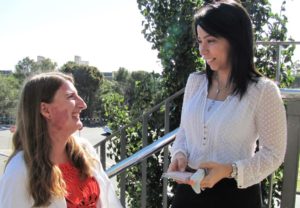
Rising Flinders medical researchers Stephanie Shepheard and Mona Awadalla will be in the spotlight at this year’s SA 2016 Fresh Science challenge.
They will take to centre-stage at the Lion Hotel, North Adelaide to showcase their discoveries in the fields of neuroscience and ophthalmology.
Dr Shepheard will run through her work on urine testing for monitoring motor neuron disease, while Dr Awadalla will promote her research into the genetic cause of Autosomal Dominant Nanophthalomos (or ‘small eye’).
Both discoveries have practical and important outcomes for developing better treatments for motor neuron disease (MND) and for discovering genetic testing for small eye disorder.
Dr Shepheard has discovered that a protein (p75NTRECD) made by cells damaged in MND is increased in urine, and that levels increase as MND worsens.
“There is an urgent need for treatments for a fatal disease which has no cure and a life expectancy of just three years after diagnosis,” says Dr Shepheard, who is based at the School of Medicine’s Motor Neuron Disease and Neurotrophic Research Laboratory at Flinders Medical Centre.
“These results suggest that we can monitor MND, and help to develop new treatments, with a simple urine test.”
Dr Awadalla’s ophthalmology group has identified a novel gene (TMEM98) that causes small eye disorder, which could eventually leads to glaucoma.
“This type of glaucoma is difficult to treat and it is not always obvious who might get the disease,” Dr Awadalla says.
“We can now offer genetic screening to high-risk families to allow earlier intervention in those who carry the genetic mutation(s), which should prevent loss of vision in those patients.”
Joining eight other South Australian early-career scientists for media training and the main event on Wednesday 15 June (RSVP), they are among 100 young scientists from around Australia nominated for Fresh Science 2016.
The 10 SA finalists will have a time to describe their scientific discoveries “in the time it takes a party sparkler to burn out” – then take questions from the audience.
Fresh Science is a national competition that helps early-career researchers share their stories of discovery and gain national media coverage for their work.
Last year’s Flinders participant, synthetic chemistry lecturer Dr Justin Chalker, says his research laboratory has spent the past year progressing his work on a new material sulfur-limonene polysulfide (SLP) which removes mercury from soil and water.
“Our lab has some new developments in our mercury-capture technology,” he says.
“The next-generation material is more efficient at binding to mercury and even cheaper than the first version.”
Former Flinders midwifery researcher Dr Julie Fleet also went through the program last year to promote research into a nose spray for childbirth pain.
Fresh Science 2016 is supported by SA Museum, Flinders University, University of Adelaide and the University of South Australia.
This year’s SA ‘Freshies’ are:
Mona Awadalla, Flinders University – Genetic cause of small eyes found by Adelaide scientists (Mutation in a Novel Gene for Autosomal Dominant Nanophthalomos).
Karen Best, South Australian Health & Medical Research Institute – Fishing for a way to prevent allergy.
Eriita Jones, University of South Australia – A global map of surface materials on Mars.
Anna Leonard, University of Adelaide – Take the pressure down: new targets for spinal trauma.
Ramkrishna Nirola, UniSA – Green and Gold actually comes out more than that.
Stephanie Plummer, University of Adelaide – Natural molecule helps brain heal itself after trauma.
Malcolm Purdey, University of Adelaide – Sensors for Healthier Hearts and Babies.
Stephanie Shepheard, Flinders University – Urine holds the key to Motor Neuron Disease (Using a urine protein to measure Motor Neurone Disease).
Hannah Wardill, University of Adelaide – TLR4: the new pain in the gut for cancer patients.
Sharon Zivkovic, UniSA – Addressing societies most wicked problems with complexity science.

